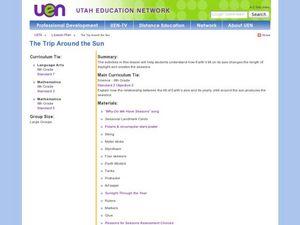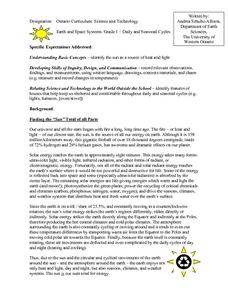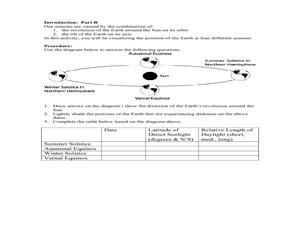California Academy of Science
Kinesthetic Astronomy: The Meaning of a Year
How many times have you traveled around the sun? Aspiring astronomers grasp what a year is and they differentiate between orbit and rotation by walking around the sun right within your classroom. Place a lamp in the center of the room to...
Curated OER
The Seasons
Discover the change of the seasons by modeling the Earth-Sun system. Learners model the orbit of the Earth around the sun and explore how and why the patterns of winter and summer occur.
Curated OER
The Earth in Space
Students use computer images to explain why the Earth has seasons and examine the phases of the moon. They create 3-D images and present them to the class. They answer a series of questions at the end of the lesson.
Curated OER
Planet Earth
In this Earth instructional activity, students review 13 terms associated with the Earth's rotation, revolution, and orbit. Students find the terms in a word search and then fill in the term next to its definition.
Curated OER
Earth's Place in Space
In this Earth learning exercise, students review how the revolution, rotation, and tilt of the Earth effects the Earth. This learning exercise has 4 matching and 3 short answer questions.
Curated OER
Heating the Earth
Middle schoolers explore how the angle of sunlight affects the Earth's temperature and seasons and then apply this understanding to their local situation.
Curated OER
What Causes Day and Night?
Why do we have four seasons? A series of questions about the Earth's orbit and its impact on seasons challenge Earth science students.The second page of the resource has nine multiple choice questions, such as "One year on Earth is one...
Curated OER
Properties of Earth: Word Search
In this word search worksheet, students search for words related to the Earth, the sun and it's movements. Terms include seasons, features, and movements.
Curated OER
The Trip Around the Sun
Sixth graders investigate the relationship between the tilt of the Earth's axis and the seasons. In this earth science instructional activity, 6th graders sing the song "Why Do We Have Seasons" and use simulate the Earth's tilt by using...
Curated OER
Our Sun and the Four Seasons
Students discover the relationship between the sun and Earth. In this weather lesson plan, students examine the effect of the sun on the Earth's seasons. Students complete a weather activity using props to simulate the sun and Earth's...
Curated OER
The Reasons for the Season
Students explain the reason for the changes in season. In this lesson examining the relationship between the Earth and the Sun, students use an applet to discover how the alignment of the Earth and the Sun cause the change in seasons.
Curated OER
Daily and Seasonal Cycles
First graders identify the sun as a source of heat and light. They identify features of houses that help keep use sheltered and comfortable throughout daily and seasonal cycles. Students are told that summer is the best season to...
Curated OER
What Causes the Seasons?
Students conduct experiment to examine how tilt of globe influences warming caused by lighted bulb. They monitor simulated warming of their city by sun in winter and in summer by using light bulb, interpret results, and submit lab report.
Curated OER
The Solar System: Go Green with the Sun!
Third graders learn how to use solar power. In this sun, technology and energy lesson, 3rd graders learn how the solar power from the sun can give off energy, learn about solar panels, discuss their uses and benefits, and design a solar...
Curated OER
Models of the Earth and Moon
Students explore the earth's rotation and phases of the moon. In this planets lesson, students rotate and revolve around a light representing the sun. Students use movement and props to simulate what causes the phases of the moon as well...
Curated OER
Reasons for Seasons
Learners investigate a model of the tilt of the Earth in its relationship to the Sun during the different seasons of the year. They study the solstices and equinoxes, while determining how sunlight hits the Earth with different angles in...
Curated OER
Tides, Eclipses, Day and Night, and Seasons
In this earth science worksheet, learners use the clues given at the bottom of the sheet to complete the crossword puzzle on tides, eclipses, day and night, and the seasons of the year. There are 17 clues to solve in the puzzle.
Curated OER
Measuring the Diameter of the Sun
Ninth graders study the sun and its distance from Earth. In this Sun's diameter lesson students examine how measurement data permits accurate measurement of the sun's diameter.
Curated OER
Sundials and Shadows - What Can They Teach Us About Seasons?
Students collect and analyze data relating to seasonal changes. They view a video, research web sites and build a sundial to collect their data.
Curated OER
Suns Path and Seasons
Using a plastic dome to represent the hemisphere of the sky, your class is able to demonstrate the path of the sun at different points of the day and year. They use a protractor to record movement and answer questions about elapsed...
Curated OER
Day And Night: Interdisciplinary Study of Cyclic Change
Eighth graders conduct a "Length of Day Symposium." They complete a variety of activities and explorations regarding the earth's rotation, its revolution around the sun and the cyclic changes in climate and energy distribution on the...
Curated OER
The Sun, Earth's Angles, and the Seasons
Students determine if the angle of light bombardment is a factor in heat absorption. They correlate these findings to the tilt of the Earth and the seasons. Students fold a pice of black construction paper in half, lengthwise. They tape...
Curated OER
Tilted Earth
What causes Earth's seasons? Find out through a series of anticipatory questions, an easy yet powerful activity representing the sun-Earth system, a diagram to label, and follow-up questions. Dispel the misconceptions about Earth being...
Curated OER
Does the Distance Between the Earth and Sun Cause the seasons?
Students reflect upon the concepts of seasons. The concepts are taught using a variety of different teaching approaches. A activities lead to a reflection that will help students to make a cognitive transfer of information form...

























